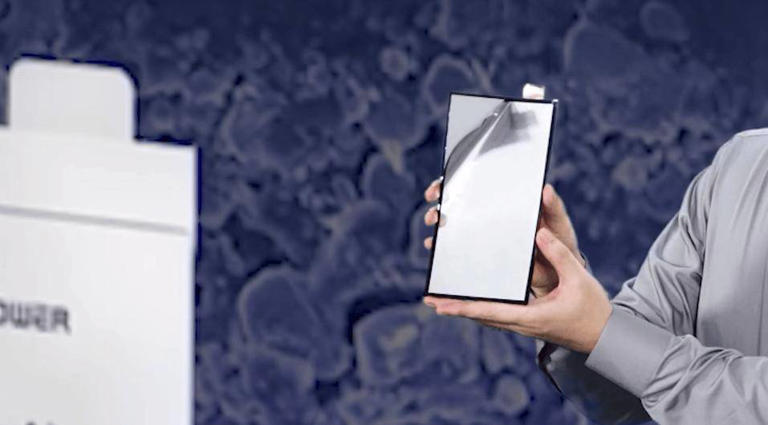Introduction:
At a new product launch on August 28, Penghui Energy made a major announcement that could revolutionize the energy storage industry. The company launched its first-generation all-solid-state battery, which is scheduled for mass production in 2026. With a capacity of 20Ah, this groundbreaking battery is expected to meet the growing demand for efficient and sustainable energy storage solutions.
The launch of Penghui Energy’s all-solid-state battery marks an important milestone in the development of energy storage technology. Unlike traditional lithium batteries, which rely on liquid or gel electrolytes, all-solid-state batteries use solid electrolytes. This design offers several advantages, including enhanced safety, higher energy density, and longer cycle life. As a result, these batteries have the potential to power a wide range of applications, from consumer electronics to electric vehicles and grid-scale energy storage systems.
.jpeg)
The breakthroughs in the field of solid-state batteries
At the press conference, Penghui Energy announced two major breakthroughs in the field of solid-state batteries: process innovation and material system optimization, which solved the technical difficulties of oxide solid electrolyte technology.
In terms of process innovation, Penghui Energy independently developed a unique electrolyte wet coating process. This process successfully bypasses the high-temperature sintering process of oxide solid electrolytes, avoids the inherent brittleness of ceramic materials, and greatly simplifies the process.
The overall cost of solid-state batteries using this process is expected to be only about 15% higher than the cost of conventional lithium batteries.
Penghui Energy said that in the next 3 to 5 years, with the continuous optimization and innovation of the process and the further reduction of material costs, the cost of its solid-state batteries is expected to be on par with conventional lithium batteries.
In terms of material innovation, Penghui Energy's solid-state battery uses an independently developed inorganic composite solid electrolyte layer. In addition to oxide electrolytes, this electrolyte layer also combines key materials such as new inorganic composite binders and functional additives.
This innovation effectively improves the brittle nature of ceramics when bent, enhances the adhesion and plasticity of the electrolyte layer, and greatly reduces the probability of internal short circuits in solid-state batteries. At the same time, it also effectively improves the ionic conductivity of the inorganic composite electrolyte layer, reduces the internal resistance of the battery cell, and further improves the heat dissipation capacity and safety performance of the solid-state battery.

The advantages of all-solid-state batteries
One of the main advantages of all-solid-state batteries is their increased safety. Unlike traditional lithium batteries, which use flammable liquid electrolytes, all-solid-state batteries use solid electrolytes. This eliminates the risk of leakage and thermal runaway, making them safer to use in a variety of applications, including electric vehicles and grid energy storage.
In addition to safety, all-solid-state batteries offer higher energy density. This means they can store more energy in a smaller, lighter package, making them ideal for portable electronics and electric vehicles. Higher energy density also means longer battery life, reduced charging frequency, and ultimately improved overall efficiency of the energy storage system.
Additionally, all-solid-state batteries exhibit better performance at extreme temperatures. Traditional batteries can become less efficient or even fail when exposed to extreme heat or cold, but solid-state batteries are more resilient to these conditions. This makes them suitable for use in a wide range of environments, including space exploration and military applications.
Another advantage of all-solid-state batteries is their potential for faster charging. Solid electrolytes allow for faster ion transport compared to traditional batteries, allowing for faster charging times. This could have a significant impact on the widespread adoption of electric vehicles and the integration of renewable energy into the grid.
Moreover, all-solid-state batteries are more environmentally friendly. They do not contain the toxic and flammable materials found in traditional batteries, reducing the risk of environmental contamination and the need for special disposal procedures.
Conclusion
The launch of Penghui Energy’s all-solid-state batteries comes at a time when the need for advanced energy storage solutions is more urgent than ever. As the world transitions to a more sustainable and electrified future, demand for high-performance, safe and reliable energy storage technology continues to grow. All-solid-state batteries have the potential to meet these needs and play a key role in shaping the future of energy storage.
If you have any questions or would like to learn more, please don't hesitate to reach out to us.
Request for Quotation:
Jacqueline: jacqueline@heltec-energy.com / +86 185 8375 6538
Sucre: sucre@heltec-bms.com / +86 136 8844 2313
Nancy: nancy@heltec-energy.com / +86 184 8223 7713
Post time: Aug-29-2024
